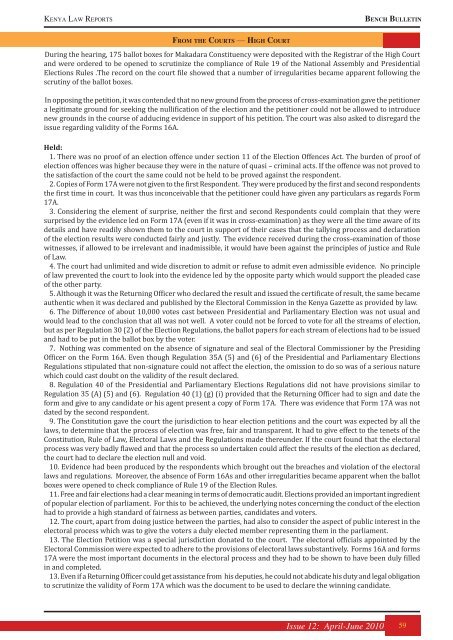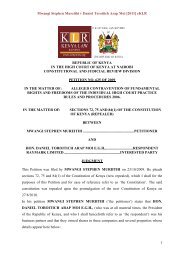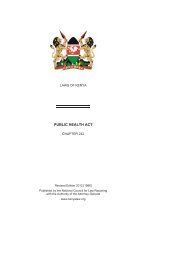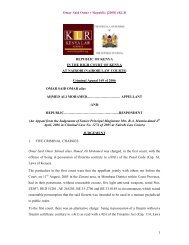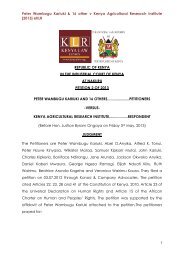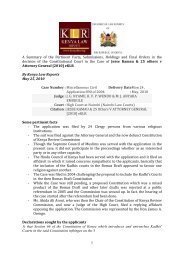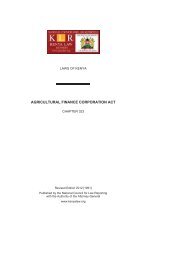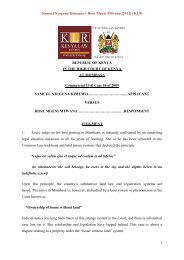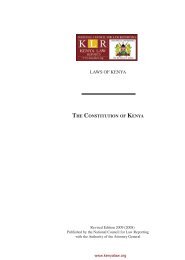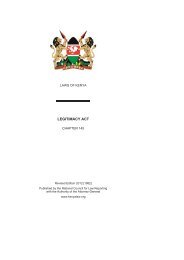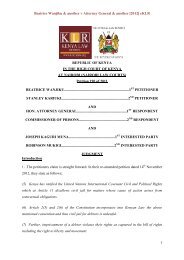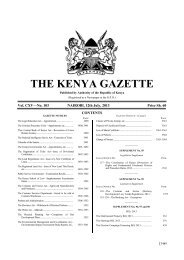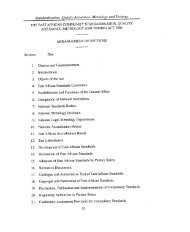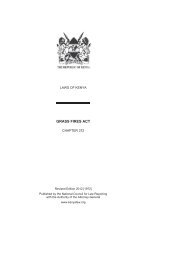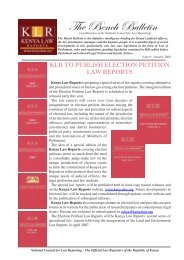Bench Bulletin - Issue 12 - Kenya Law Reports
Bench Bulletin - Issue 12 - Kenya Law Reports
Bench Bulletin - Issue 12 - Kenya Law Reports
You also want an ePaper? Increase the reach of your titles
YUMPU automatically turns print PDFs into web optimized ePapers that Google loves.
KENYA LAW REPORTS<br />
BENCH BULLETIN<br />
FROM THE COURTS — HIGH COURT<br />
During the hearing, 175 ballot boxes for Makadara Constituency were deposited with the Registrar of the High Court<br />
and were ordered to be opened to scrutinize the compliance of Rule 19 of the National Assembly and Presidential<br />
Elections Rules .The record on the court file showed that a number of irregularities became apparent following the<br />
scrutiny of the ballot boxes.<br />
In opposing the petition, it was contended that no new ground from the process of cross-examination gave the petitioner<br />
a legitimate ground for seeking the nullification of the election and the petitioner could not be allowed to introduce<br />
new grounds in the course of adducing evidence in support of his petition. The court was also asked to disregard the<br />
issue regarding validity of the Forms 16A.<br />
Held:<br />
1. There was no proof of an election offence under section 11 of the Election Offences Act. The burden of proof of<br />
election offences was higher because they were in the nature of quasi – criminal acts. If the offence was not proved to<br />
the satisfaction of the court the same could not be held to be proved against the respondent.<br />
2. Copies of Form 17A were not given to the first Respondent. They were produced by the first and second respondents<br />
the first time in court. It was thus inconceivable that the petitioner could have given any particulars as regards Form<br />
17A.<br />
3. Considering the element of surprise, neither the first and second Respondents could complain that they were<br />
surprised by the evidence led on Form 17A (even if it was in cross-examination) as they were all the time aware of its<br />
details and have readily shown them to the court in support of their cases that the tallying process and declaration<br />
of the election results were conducted fairly and justly. The evidence received during the cross-examination of those<br />
witnesses, if allowed to be irrelevant and inadmissible, it would have been against the principles of justice and Rule<br />
of <strong>Law</strong>.<br />
4. The court had unlimited and wide discretion to admit or refuse to admit even admissible evidence. No principle<br />
of law prevented the court to look into the evidence led by the opposite party which would support the pleaded case<br />
of the other party.<br />
5. Although it was the Returning Officer who declared the result and issued the certificate of result, the same became<br />
authentic when it was declared and published by the Electoral Commission in the <strong>Kenya</strong> Gazette as provided by law.<br />
6. The Difference of about 10,000 votes cast between Presidential and Parliamentary Election was not usual and<br />
would lead to the conclusion that all was not well. A voter could not be forced to vote for all the streams of election,<br />
but as per Regulation 30 (2) of the Election Regulations, the ballot papers for each stream of elections had to be issued<br />
and had to be put in the ballot box by the voter.<br />
7. Nothing was commented on the absence of signature and seal of the Electoral Commissioner by the Presiding<br />
Officer on the Form 16A. Even though Regulation 35A (5) and (6) of the Presidential and Parliamentary Elections<br />
Regulations stipulated that non-signature could not affect the election, the omission to do so was of a serious nature<br />
which could cast doubt on the validity of the result declared.<br />
8. Regulation 40 of the Presidential and Parliamentary Elections Regulations did not have provisions similar to<br />
Regulation 35 (A) (5) and (6). Regulation 40 (1) (g) (i) provided that the Returning Officer had to sign and date the<br />
form and give to any candidate or his agent present a copy of Form 17A. There was evidence that Form 17A was not<br />
dated by the second respondent.<br />
9. The Constitution gave the court the jurisdiction to hear election petitions and the court was expected by all the<br />
laws, to determine that the process of election was free, fair and transparent. It had to give effect to the tenets of the<br />
Constitution, Rule of <strong>Law</strong>, Electoral <strong>Law</strong>s and the Regulations made thereunder. If the court found that the electoral<br />
process was very badly flawed and that the process so undertaken could affect the results of the election as declared,<br />
the court had to declare the election null and void.<br />
10. Evidence had been produced by the respondents which brought out the breaches and violation of the electoral<br />
laws and regulations. Moreover, the absence of Form 16As and other irregularities became apparent when the ballot<br />
boxes were opened to check compliance of Rule 19 of the Election Rules.<br />
11. Free and fair elections had a clear meaning in terms of democratic audit. Elections provided an important ingredient<br />
of popular election of parliament. For this to be achieved, the underlying notes concerning the conduct of the election<br />
had to provide a high standard of fairness as between parties, candidates and voters.<br />
<strong>12</strong>. The court, apart from doing justice between the parties, had also to consider the aspect of public interest in the<br />
electoral process which was to give the voters a duly elected member representing them in the parliament.<br />
13. The Election Petition was a special jurisdiction donated to the court. The electoral officials appointed by the<br />
Electoral Commission were expected to adhere to the provisions of electoral laws substantively. Forms 16A and forms<br />
17A were the most important documents in the electoral process and they had to be shown to have been duly filled<br />
in and completed.<br />
13. Even if a Returning Officer could get assistance from his deputies, he could not abdicate his duty and legal obligation<br />
to scrutinize the validity of Form 17A which was the document to be used to declare the winning candidate.<br />
<strong>Issue</strong> <strong>12</strong>: April-June 2010<br />
59


